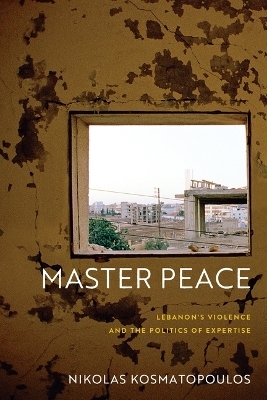
Master Peace
Lebanon's Violence and the Politics of Expertise
Seiten
2024
University of Pennsylvania Press (Verlag)
978-1-5128-2675-3 (ISBN)
University of Pennsylvania Press (Verlag)
978-1-5128-2675-3 (ISBN)
Examines the politics of expertise in the practices of peacemaking in post–civil war Lebanon
Based on multi-sited ethnographic research centering on Beirut, but tracing international peace work as far as Switzerland and the United States, Master Peace examines the politics of expertise in the application of metropolitan theories of violence and practices of peacemaking in post–civil war Lebanon. Through ethnographic encounters, archival research, and interviews that shed light on the worlds of academic research, UN agencies, NGOs, and think tanks, Nikolas Kosmatopoulos argues that so-called experts, from violence researchers to peace professionals, have often misrepresented and exacerbated the violence they claim to be tackling, through their deployment of racialized tropes of conflict and communalizing peace practices.
The assemblage of these tropes and practices, which Kosmatopoulos calls “master peace,” naturalizes social and structural inequalities by collapsing them into supposedly innate cultural and sectarian divisions. Master peace installs unequal relations of domination through the work of metropolitan theories, as in “ethnic conflict” and “failed state,” and practices, such as conflict resolution workshops and crisis reports, converting the radical demand for just peace into a postcolonial regime of dependence on technocratic tools, unaccountable experts, and external donors.
Kosmatopoulos shows how master peace has been framing debates, designing interventions of peace and war, and defining the problem of violence in Lebanon and the Middle East for decades, to deleterious effect. As the supposed moral high ground that justifies external intervention and precludes political solutions or democratic forms of action, master peace has obscured the geopolitical and ideological nature of violence in the region, substituting democratic notions of peace for an elitist antipolitics of expertise characterized by dependence, domination, and epistemic violence.
Based on multi-sited ethnographic research centering on Beirut, but tracing international peace work as far as Switzerland and the United States, Master Peace examines the politics of expertise in the application of metropolitan theories of violence and practices of peacemaking in post–civil war Lebanon. Through ethnographic encounters, archival research, and interviews that shed light on the worlds of academic research, UN agencies, NGOs, and think tanks, Nikolas Kosmatopoulos argues that so-called experts, from violence researchers to peace professionals, have often misrepresented and exacerbated the violence they claim to be tackling, through their deployment of racialized tropes of conflict and communalizing peace practices.
The assemblage of these tropes and practices, which Kosmatopoulos calls “master peace,” naturalizes social and structural inequalities by collapsing them into supposedly innate cultural and sectarian divisions. Master peace installs unequal relations of domination through the work of metropolitan theories, as in “ethnic conflict” and “failed state,” and practices, such as conflict resolution workshops and crisis reports, converting the radical demand for just peace into a postcolonial regime of dependence on technocratic tools, unaccountable experts, and external donors.
Kosmatopoulos shows how master peace has been framing debates, designing interventions of peace and war, and defining the problem of violence in Lebanon and the Middle East for decades, to deleterious effect. As the supposed moral high ground that justifies external intervention and precludes political solutions or democratic forms of action, master peace has obscured the geopolitical and ideological nature of violence in the region, substituting democratic notions of peace for an elitist antipolitics of expertise characterized by dependence, domination, and epistemic violence.
Nikolas Kosmatopoulos is Assistant Professor of Politics and Anthropology at the American University of Beirut.
| Erscheinungsdatum | 20.11.2024 |
|---|---|
| Reihe/Serie | The Ethnography of Political Violence |
| Verlagsort | Pennsylvania |
| Sprache | englisch |
| Maße | 152 x 229 mm |
| Themenwelt | Sozialwissenschaften ► Ethnologie |
| Sozialwissenschaften ► Politik / Verwaltung ► Europäische / Internationale Politik | |
| Sozialwissenschaften ► Soziologie | |
| ISBN-10 | 1-5128-2675-8 / 1512826758 |
| ISBN-13 | 978-1-5128-2675-3 / 9781512826753 |
| Zustand | Neuware |
| Haben Sie eine Frage zum Produkt? |
Mehr entdecken
aus dem Bereich
aus dem Bereich
erfolgreiche Interessenvertretung durch Prozesskompetenz im komplexen …
Buch | Hardcover (2023)
Wiley-VCH (Verlag)
CHF 58,75
Studienbuch
Buch | Hardcover (2023)
De Gruyter Oldenbourg (Verlag)
CHF 62,90


